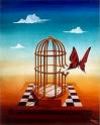|
ESL Forum:
Techniques and methods
in Language Teaching
Games, activities
and teaching ideas
Grammar and
Linguistics
Teaching material
Concerning
worksheets
Concerning
powerpoints
Concerning online
exercises
Make suggestions,
report errors
Ask for help
Message board
|
ESL forum >
Ask for help > Can you tell me the difference?
Can you tell me the difference?
|

miss noor

|
Can you tell me the difference?
|
|
Hi,
Can you tell me the difference in using if in the following sentences :
1- If Shakespeare lived today , he would use different English.
2- If she had worked hard , she would have succeeded.
no.1 is imagined and no.2 is imagined ,too.
So why do we use different tenses ?
Thanks in advance,
Noor
|
26 Apr 2010
|
|
|
|

arlissa

|
|
I think sentence 1 is incorrect; it should properly read, "If Shakespeare were alive today, he would use different English."
|
26 Apr 2010
|
|
|

yanogator

|
|
I don �t think #1 is incorrect, but arlissa �s re-working of it is definitely better.
Anyway, the different tenses are because of different times. #1 is talking about today. #2 is about the past.
Bruce |
26 Apr 2010
|
|
|

spoonmaster1

|
Both sentences are correct.
1st sentence- 2nd conditional- refering to the present.
2nd sentence- 3rd conditional- refering to the past. -means: she didn �t work hard and therefore she did not succeed.
Jo
|
26 Apr 2010
|
|
|

miss noor

|
|
Can we use different tenses to talk about something imagined ?? |
26 Apr 2010
|
|
|

spoonmaster1

|
Hmm... to explain it off-hand:
It does not mean �imagined �. We use these constructions to talk about things that are impossible to happen/change.
If I were a bird, I would fly -but I �m not so i can �t fly.
If he had been nicer the other day, we would have gone for a date.- but he wasn �t nice and we didn �t go.
|
26 Apr 2010
|
|
|

niacouto

|
|
well, I think number 2 expresses regret for something that will never happen to her (succeeding), which is impossible because she didn �t meet a crucial condition for that (working hard).
|
26 Apr 2010
|
|
|

spoonmaster1

|
no 2.
I wouldn �t say it refers to sth that �will never happen � becuse it refers to the past.
|
26 Apr 2010
|
|
|

spoonmaster1

|
however, if you make it a mixed conditional sentence, you can refer to the present:
Is she had worked hard during her studies, she would be a successful lawyer today.
|
26 Apr 2010
|
|
|